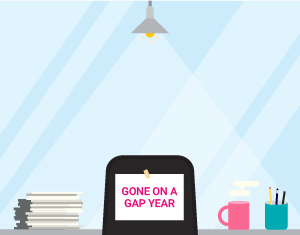It’s a fact: we’re living longer. According to the 2016 census, nearly one in every six people in Australia are aged 65 and over. Estimates show that by the end of the next decade, one in three Australians will be aged over 55.
Because we’re living longer, we’re also working longer. “If you live to 100, you’re working until you’re 70 or 80,” said Lynda Gratton, author of The 100-Year Life and Professor of Management Practice at London Business School, in our recent Talent Talks podcast.
“That means the current lifestyle we have of full-time education, full-time work and full-time retirement just isn’t going to work. We need something a lot more flexible; what I would call a multi-stage life.”
In other words, Lynda says that because our retirement is now delayed and potentially shorter, we should spread that time off throughout our careers, instead of waiting until the end to take it. That way we can use it to the fullest.
Consider taking a gap year, mid-career
Taking time off doesn’t have to mean lying on a beach and being unproductive, although this kind of downtime is definitely needed on occasion. It could mean factoring in work-life balance, education and other enlightening experiences, which could be done via a gap year (or two, or three!).
Taking a gap year mid-career is good for you
Time off is obviously important for your physical and mental health, allowing you to regenerate so that when you return you feel ready to tackle your work with newfound energy.
It can also allow you to develop new skills, expand your perspective and discover new technologies, which not only improve your work now, but make you an even more desirable employee for future opportunities.
All of this will also mean you’re a more well-rounded person, because by taking time to do things you want to do at a younger age, you’ll be living a more balanced life. As Lynda says, “Your working life isn’t a sprint anymore, it’s a marathon. So, you need to pace yourself.”
Don’t worry about appearances
If you’re worried about a gap year potentially looking weird on your resume, don’t. “It would look great!” Lynda says. It shows that you’re proactive about staying on top of your mental and physical well-being, being practical about the future, and taking life’s opportunities as they come.
Lynda says people who take gap years mid-career typically “do exciting things” – “they go to Africa, they work in communities. And when they come back, people say ‘wow, that’s really awesome. You’ve built a new set of skills that could be really helpful!’”
So how do you remap your career?
- Think positively
Change can sound scary, but it’s actually a really positive thing. As Lynda says, jobs aren’t being destroyed due to technological advances, they’re changing. “Machines are doing the boring bits – isn’t that great? That leaves you to upskill and to do more of the interesting stuff!” she says. By looking at technological advances as providing opportunities to upskill and learn new things, we are likely to find work more enjoyable and exciting, and do better because of it. So, stay positive!
- Become a lifelong learner.
Lynda says, “There are other ways to learn than just going to university, particularly online,” and she’s right. With the range of online courses at your fingertips, there’s no excuse not to keep refreshing your skill set, whether that’s by taking a university paper, signing up for an online course, or trying out new software. Take a proactive approach to learning and regularly updating your repertoire of skills and knowledge, and you will reap the benefits.
- Factor in work-life balance.
Just as we should keep working hard, we also need to keep our life balance in check. “So working flexibly, having more autonomy, taking time off to look after your kids, taking time off to go round the world – that’s very sensible if you’re going to work until you’re 80,” Lynda reasons. What is manageable in this regard is different for everyone, but it could be as simple as ensuring you have regular time off with your family.
The important thing is to change the way we think about time. Don’t fixate on the future; focus on the present. As Lynda says, wonderful things can happen when there are extraordinary technologies and we have a lifespan that’s long enough for us to enjoy them. So, take advantage of the opportunities!



